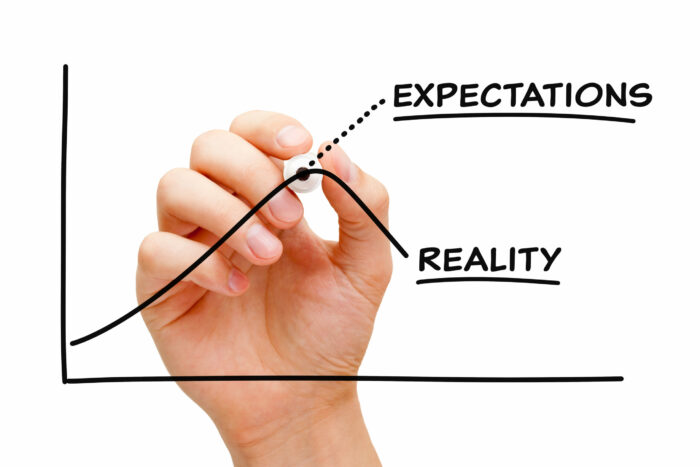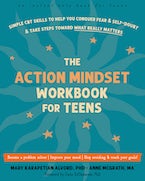By Mary Karapetian Alvord, PhD and Anne McGrath, MA, coauthors of The Action Mindset Workbook for Teens
The problem with demanding perfection of yourself is that you’re bound to be disappointed again and again, because it’s an unattainable goal. On the other hand, wanting to do your best at whatever really matters to you is an admirable, healthy quality. A desire for excellence can inspire you to practice, work hard to reach your goals, and improve your skills and abilities. Being human means that we’re bound to make mistakes, and that’s okay—what matters is that we learn from them. Bouncing back and continuing to try are normal and necessary steps along the path to success. If you doubt that your missteps can ever lead to good things, consider some examples of great success in spite of imperfection:
Basketball phenom Michael Jordan didn’t make his high school varsity basketball team when he tried out at first, and had to play junior varsity instead (Anderson 2019). In a 1997 commercial made for Nike, he described the thousands of missed shots and the many lost games of his career as being key to his success. “I’ve failed over and over and over again in my life, and that is why I succeed,” he said.
Apple cofounder Steve Jobs once told a graduating class at Stanford University that being publicly fired from the company at age thirty was devastating but that he decided to continue doing what he loved—working on new ideas and technology. Within five years, he’d started two new companies: the super-successful animation company Pixar and a computer start-up that Apple ended up buying, which brought him back to lead Apple again. Being fired, he told the graduates, was “the best thing that could have ever happened to me” (Jobs 2005).
It was a mistake that led Alexander Fleming, a scientist who was researching ways to treat bacterial infections, to discover the life-saving drug penicillin. One day, he discovered that one of his cultures had been accidentally contaminated, and that mold was growing on it. But the good news was that the mold was preventing the bacteria from growing! Fhleming was later awarded a Nobel Prize for his discovery (Nobel Prize n.d.).
GETTING UNSTUCK: EXAMINE YOUR THOUGHTS
So how can perfectionists overcome their fear of mistakes and failing? It may be faulty negative thinking that is holding you back. If so, you can examine those unfriendly thoughts and consider what is more likely true. Many teens with perfectionist tendencies, for example, fall into the habit of all-or-nothing thinking. This means that they see the world—and their performance—in terms of polar extremes. If an outcome isn’t terrific, it’s horrible. If it’s not a total success, it’s a complete failure. They ignore the many (and more likely!) gradations of possibilities between those extremes. To break the all-or-nothing habit, you can explore that range of other possibilities short of “complete failure.” Sure, you’ve missed a few volleyball serves in gym class, but so have most of your classmates. And you haven’t missed all of them. Besides, you’re pretty good at returning the ball during volleys. Rather than an imperfect serve being a sign that you’re a loser, isn’t it more likely that your miss is just one of many misses a team deals with in a typical game? As far as the science project goes, making a presentation that has a few stumbles in it isn’t the end of the world. A couple of slips of the tongue won’t change the fact that the research itself is solid. And you have time to practice describing it beforehand. You can always pause and refer to your notes if necessary. Another common thinking habit that many perfectionists share is the “I should” habit. Teens who see the world in terms of what “should” happen hold themselves to rigid standards of what’s acceptable. And they feel guilty, frustrated, and discouraged when they let themselves down (I should have gotten an A! and I should have made that goal!). If this sounds like you, it can pay off in a big way to practice being a more flexible thinker. Are your “should” thoughts reasonable? Sometimes they will be, of course—for example, I should study for my big test tomorrow or I should remember to call Grandma on her birthday. Often, though, your “shoulds” are just expressions of your own unrealistic standards. Examining the many other possible outcomes that would actually be okay (or even fine!) can help you become more accepting of your own occasional (and perfectly normal) goofs.
GETTING UNSTUCK: PRACTICE IMPERFECTION
Obviously, accepting their own imperfection requires perfectionists to tolerate some discomfort, so the action-first exposure approach can also be very helpful when you’re frozen in your tracks by fear of failing. Therapists who work with teen perfectionists often rely on exposure therapy, guiding teens to practice tolerating this discomfort by purposely exposing themselves to it. They fall short of their own standards or make blunders on purpose, for example. Do you get stuck on one paragraph in an essay you are writing because it’s not exactly as you want it to be, so you stop trying and put the assignment off? Make yourself get the paragraph down even though it isn’t perfect, and then write the next one and the next until you’ve finished. Are you avoiding the science fair because of worry about presenting it to the judges? Try answering a question in class with the wrong answer, and then correct yourself. Experiencing imperfect outcomes and adjusting to their consequences—which may be nonexistent, and almost certainly will be much less severe than you imagine they’ll be—can help you become more flexible and accepting of yourself. And more willing to take a chance when you aren’t sure you’ll succeed.
GIVE YOURSELF A BREAK
Finally, think about this: What would you say to friends who make a mistake and feel down or angry at themselves? Perfectionists are often much more forgiving of others’ goofs than they are of their own, and would naturally offer encouragement and compassion to a friend who messes up. You can try an experiment and do the same for yourself. Next time the voice in your head is demanding perfection or judging your performance harshly, try remembering your strengths and achievements. And give yourself credit—and some empathy.
Mary Karapetian Alvord, PhD, is a licensed psychologist with more than forty years of clinical experience, and is director of Alvord, Baker & Associates. She specializes in treating children, adolescents, and adults using cognitive behavioral therapies.
Anne McGrath, MA, is former executive editor of publications at U.S. News & World Report, where she wrote and edited on subjects from health and mental health to investing and education for more than thirty-five years.



 2024 Peace Playbook: 3 Tactics to Avoid Clashes with Your Partner
2024 Peace Playbook: 3 Tactics to Avoid Clashes with Your Partner